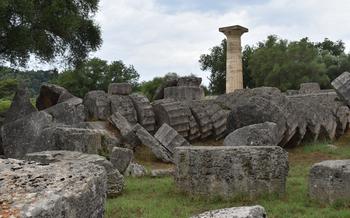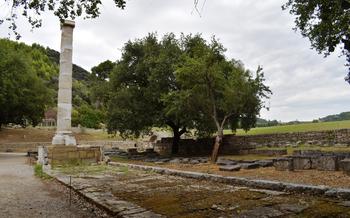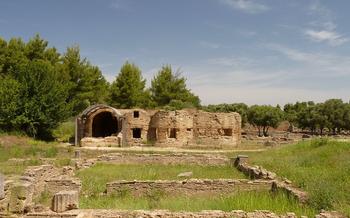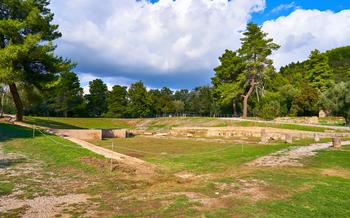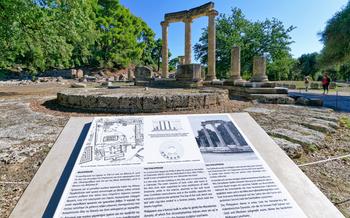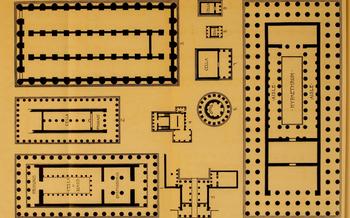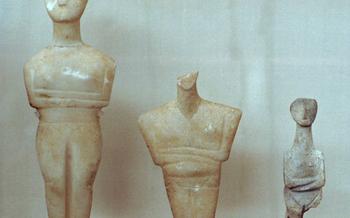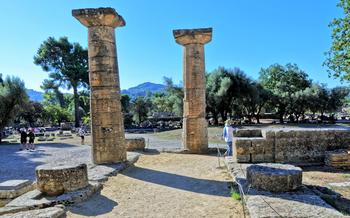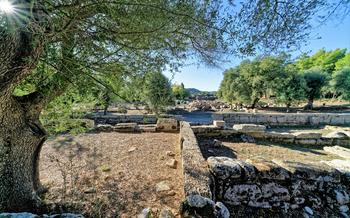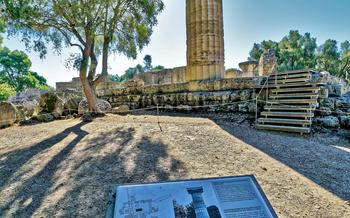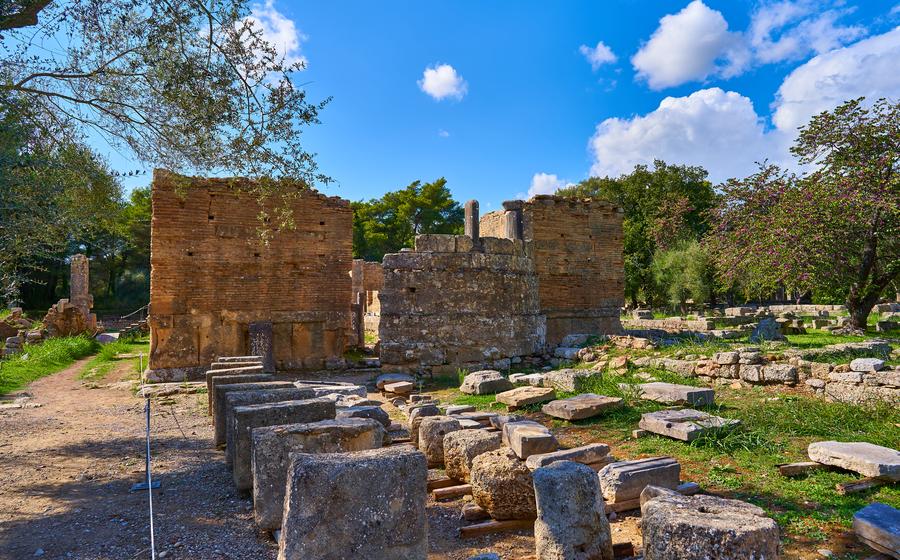
Ancient Pheidias Workshop
- Historical Significance
- Location and Accessibility
- Hours of Operation and Admission
- Guided Tours and Audio Guides
- What to Expect
- Highlights of the Workshop
- Interactive Exhibits and Activities
- Historical Context
- Nearby Attractions
- Photography and Videography
- Souvenirs and Mementos
- Accessibility for Visitors with Disabilities
- Tips for a Fulfilling Visit
- Common Questions and Answers:
- Insider Tip: Unveiling the Hidden Treasure of Olympia
Historical Significance
Journey back in time to the Ancient Pheidias Workshop in Olympia, Greece, where the legendary sculptor Pheidias, renowned for his artistic genius, crafted his masterpieces. This extraordinary workshop played a pivotal role in shaping the artistic landscape of ancient Greece. Here, Pheidias and his skilled team painstakingly created iconic sculptures that adorned the Temple of Zeus, a majestic edifice that once stood as a testament to the power and glory of the Olympian gods. The workshop's contributions to Greek art and sculpture were profound, leaving an indelible mark on the cultural heritage of the ancient world. Delve into the fascinating history of Pheidias and his workshop, and discover the secrets behind the creation of some of the most awe-inspiring sculptures of antiquity.
Location and Accessibility
The Ancient Pheidias Workshop is situated in the heart of Olympia, Greece, an ancient city renowned for its religious and athletic significance. To reach this historic site, visitors can conveniently take public transportation, which offers regular bus services from major cities and towns in the region. Additionally, Olympia is well-connected by road, making it easily accessible by car. For those with personal vehicles, ample parking is available nearby. The workshop is designed to be accessible to visitors of all abilities, with designated ramps and pathways ensuring ease of movement throughout the site. For those with specific needs, wheelchairs and other assistive devices can be arranged upon request, allowing everyone to have an enriching and inclusive experience.
Hours of Operation and Admission
The Ancient Pheidias Workshop is generally open to the public daily from 8:00 AM to 8:00 PM during the summer months (April to October). In the winter season (November to March), the hours may be reduced to 8:00 AM to 5:00 PM. It is advisable to check the official website or contact the workshop directly for the most up-to-date information on operating hours and any potential closures.
Admission to the Ancient Pheidias Workshop is typically included in the entrance fee for the Archaeological Site of Olympia, which is 12 euros for adults, 6 euros for students and seniors, and free for children under 6 years old. Reduced rates may be available for groups or families.
Visitors are encouraged to plan their visit during the shoulder seasons (spring or fall) to avoid the summer crowds and enjoy a more immersive experience. The workshop can get busy during peak tourist season, so arriving early or late in the day can help avoid the rush.
Guided Tours and Audio Guides
Enhance your visit to the Ancient Pheidias Workshop by opting for a guided tour, led by knowledgeable historians or archaeologists. These experts will provide insightful commentary, delving into the history, significance, and techniques behind Pheidias's masterpieces. Guided tours offer a deeper understanding of the workshop's role in ancient Greek art and culture, making your experience more enriching and memorable.
Audio guides are also available for those who prefer a self-guided tour. These audio guides provide a comprehensive narrative of the workshop's history, allowing you to explore at your own pace and focus on specific areas of interest. Whether you choose a guided tour or an audio guide, these resources will greatly enhance your understanding and appreciation of the Ancient Pheidias Workshop.
What to Expect
As you step into the Ancient Pheidias Workshop, prepare to be transported back in time to the era of ancient Greek artistry. The workshop's layout is designed to showcase the various stages of sculpture creation, from initial sketches to the final masterpieces. Admire the intricate tools and techniques used by Pheidias and his team as you wander through the workshop's different sections. The atmosphere is one of awe and inspiration, as you can almost feel the presence of the great sculptor himself. Take your time to explore each corner of the workshop and let the history and artistry seep into your soul. This is a place where the past comes alive, and you'll leave with a newfound appreciation for the genius of Pheidias and the enduring legacy of ancient Greek art.
Highlights of the Workshop
The Ancient Pheidias Workshop is home to a treasure trove of remarkable sculptures that showcase the extraordinary talent of Pheidias and his team. Among the most notable highlights are the colossal Statue of Zeus, once considered one of the Seven Wonders of the Ancient World. Standing over 12 meters tall, this awe-inspiring sculpture was crafted from ivory and gold and depicted the Greek god Zeus seated on a magnificent throne. Its intricate details and majestic presence left visitors in awe and cemented Pheidias's reputation as a master sculptor.
Other notable works include the pedimental sculptures from the Temple of Zeus, which depict scenes from Greek mythology, and the metopes, which showcase the labors of Hercules. These intricate carvings demonstrate Pheidias's mastery of composition, anatomy, and emotional expression, capturing the essence of the mythological narratives in stone.
The workshop also houses a collection of tools and materials used by Pheidias and his team, providing visitors with a glimpse into the techniques and processes involved in creating these magnificent sculptures. From chisels and hammers to molds and casting techniques, these artifacts offer a deeper understanding of the craftsmanship and artistry that went into each masterpiece.
Interactive Exhibits and Activities
The Ancient Pheidias Workshop offers a range of interactive exhibits and activities that enhance the visitor experience and provide a deeper understanding of the workshop's history. These interactive elements bring the past to life and make the workshop more engaging and memorable for visitors of all ages.
One of the highlights is a hands-on replica of the Statue of Zeus, allowing visitors to experience the sheer size and grandeur of this iconic masterpiece. Visitors can also try their hand at sculpting using traditional tools and techniques, gaining a firsthand appreciation for the skill and artistry of Pheidias and his team.
Educational programs and workshops are also offered, providing visitors with the opportunity to learn more about ancient Greek art and sculpture. These programs are led by experienced historians and archaeologists who share their knowledge and insights, making the workshop's history come alive.
Whether it's sculpting your own masterpiece, learning about the techniques of ancient Greek artists, or simply exploring the interactive exhibits, the Ancient Pheidias Workshop offers a truly immersive and educational experience for visitors of all interests.
Historical Context
The Ancient Pheidias Workshop holds immense significance as it serves as a testament to the vibrant religious, athletic, and cultural traditions of ancient Greece. Olympia, where the workshop is located, was renowned throughout the ancient world as a sanctuary dedicated to Zeus, the king of the gods. Every four years, the city hosted the Olympic Games, a grand athletic and cultural festival that brought together athletes, artists, and spectators from across Greece and beyond.
The workshop thrived within this dynamic environment, contributing to the rich artistic legacy of Olympia and the broader Greek civilization. Pheidias, the renowned sculptor who led the workshop, played a pivotal role in shaping the visual representation of the gods and goddesses of the Greek pantheon. His masterpieces, including the iconic Statue of Zeus at Olympia, were deeply rooted in Greek mythology and religious beliefs, embodying the divine power and majesty of the gods.
The workshop's sculptures also reflected the competitive spirit of the Olympic Games. Athletes who emerged victorious in these prestigious contests were often immortalized in bronze or marble statues, capturing their triumphs and celebrating the ideals of physical excellence and sportsmanship. These sculptures served as a lasting testament to the achievements of these athletes, inspiring future generations to strive for greatness.
Beyond its religious and athletic significance, the Ancient Pheidias Workshop played a crucial role in the development of ancient Greek art and culture. Pheidias and his team of skilled artisans experimented with innovative techniques and materials, pushing the boundaries of artistic expression. Their mastery of anatomy, proportion, and composition set new standards for classical sculpture, influencing the course of art history for centuries to come.
Nearby Attractions
Olympia is home to several other significant attractions that visitors can explore in conjunction with their visit to the Ancient Pheidias Workshop. The Archaeological Museum of Olympia is a must-see, showcasing an impressive collection of artifacts from the ancient Olympic Games and the surrounding area. The Temple of Zeus, one of the Seven Wonders of the Ancient World, is located just a short walk from the workshop and offers a glimpse into the grandeur of ancient Greek architecture.
For those interested in the history of the Olympic Games, the Ancient Olympic Stadium is a must-visit. This well-preserved stadium, where the ancient Olympic Games were held, offers a unique opportunity to experience the birthplace of the modern Olympic tradition.
Visitors can also explore the Sanctuary of Zeus, a sacred grove where ancient Greeks worshipped Zeus and other deities. The sanctuary is home to several well-preserved temples, altars, and statues, providing a glimpse into the religious practices of ancient Greece.
To make the most of their time in Olympia, visitors can purchase a combined ticket that grants access to the Ancient Pheidias Workshop, the Archaeological Museum, and the Ancient Olympic Stadium. This ticket offers a significant discount and allows visitors to explore all of Olympia's major attractions at a reduced cost.
Photography and Videography
The Ancient Pheidias Workshop allows visitors to capture the beauty and significance of the site through photography and videography. Visitors are welcome to take photos and videos for personal use, but commercial photography or videography requires prior permission from the authorities. When taking photos or videos, it is essential to be respectful of other visitors and the historical significance of the site. Using flash photography is prohibited to preserve the delicate artifacts and sculptures. Additionally, visitors are encouraged to follow any designated photography areas or viewpoints to minimize disruption to other visitors.
Souvenirs and Mementos
The Ancient Pheidias Workshop offers a unique opportunity to purchase souvenirs and mementos that commemorate your visit and celebrate the rich history of Olympia. Within the workshop or nearby, you'll find a selection of gift shops and souvenir stands that offer a variety of items to suit every taste and budget.
Browse through replicas of famous sculptures created by Pheidias and his team, such as the majestic Statue of Zeus or the intricate Hermes of Praxiteles. These replicas are crafted with great attention to detail and serve as a tangible reminder of the workshop's artistic legacy.
You can also find books and postcards that delve deeper into the history of the workshop, the life of Pheidias, and the significance of Olympia in ancient Greece. These publications provide a wealth of information and make for a thoughtful gift or a valuable addition to your personal library.
Traditional Greek handicrafts, such as pottery, jewelry, and woven goods, are also available as souvenirs. These items showcase the artistry and craftsmanship of local artisans and offer a unique way to remember your time in Olympia.
By purchasing souvenirs from the Ancient Pheidias Workshop, you not only take home a piece of history but also contribute to the preservation and promotion of Greek cultural heritage. Support local artisans and businesses as you create lasting memories of your visit to this remarkable site.
Accessibility for Visitors with Disabilities
The Ancient Pheidias Workshop is committed to providing an inclusive and enjoyable experience for all visitors, including those with disabilities. The site features accessible pathways and ramps to facilitate movement around the workshop. Wheelchairs and other assistive devices are available upon request to ensure that visitors with mobility impairments can fully explore the site. The workshop's staff is also trained to assist visitors with disabilities and provide any necessary support. By offering these accessibility features, the Ancient Pheidias Workshop strives to create a welcoming and accessible environment for visitors of all abilities.
Tips for a Fulfilling Visit
Comfortable Attire: Opt for comfortable walking shoes and attire that allows for easy movement, as the workshop involves exploring uneven surfaces and navigating historical pathways.
Hydration and Snacks: Bring along water and snacks, as food and beverage options on-site may be limited. Staying hydrated and energized will enhance your exploration experience.
Shoulder Season Magic: Consider visiting during the shoulder seasons (spring or fall) to avoid the peak summer crowds. This allows for a more immersive and tranquil experience, with fewer distractions.
Take Your Time: Don't rush through your visit. Dedicate ample time to explore the workshop's exhibits and immerse yourself in its historical significance. Slow down, observe, and appreciate the beauty and craftsmanship of the ancient sculptures.
Common Questions and Answers:
Is the workshop open year-round?
The Ancient Pheidias Workshop is open to the public throughout the year, with the exception of certain national holidays. It is advisable to check the official website or contact the local tourism office for the most up-to-date information on opening hours and any temporary closures.
Are there any guided tours available?
Guided tours of the Ancient Pheidias Workshop are available in multiple languages and offer a more in-depth exploration of the site's history and significance. Guided tours are typically led by experienced historians or archaeologists who can provide insights and anecdotes that enhance the visitor experience.
Can I take photos or videos inside the workshop?
Photography and videography are generally permitted inside the Ancient Pheidias Workshop, but visitors are advised to be respectful of other visitors and the historical significance of the site. Flash photography and the use of tripods or other professional equipment may be restricted in certain areas.
Are there any discounts or concessions available?
Discounts or concessions may be available for students, seniors, or groups. It is advisable to inquire about these discounts when purchasing tickets or making reservations. Combination tickets that include admission to multiple attractions in Olympia may also provide cost savings.
What is the best time to visit the workshop?
The best time to visit the Ancient Pheidias Workshop is during the shoulder seasons (spring or fall), when the weather is pleasant and the crowds are smaller. During the summer months, the site can be quite crowded, especially during peak tourist season.
Insider Tip: Unveiling the Hidden Treasure of Olympia
Beyond the workshop's renowned masterpieces, Olympia holds a hidden gem that often goes unnoticed by visitors. Nestled amidst the ruins of the ancient city, the Archaeological Museum of Olympia houses a treasure trove of artifacts that provide a deeper glimpse into the history and culture of Olympia. From intricate bronze statues to stunning gold jewelry, the museum's collection offers a fascinating journey through the artistic and athletic achievements of ancient Greece. Take the time to explore this hidden gem and discover the untold stories of Olympia's glorious past.
